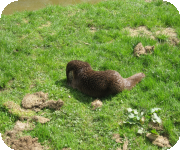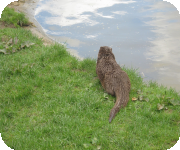Otters
The common or European otter (Lutra lutra), is the only native otter in the United Kingdom. Once common throughout the British Isles they declined markedly through the late 1950's and early 1960's due to a variety of problems, but primarily related to pesticides in their food chain. This decline was mirrored right across Europe and has resulted in their extinction in some countries. As a result the species has been given full protection throughout the European Union.
Today Wales and the west of England represent some of the main strongholds for the species and with improving water quality the otter is rediscovering old haunts across much of Britain, including some of our cities and towns. Otters can live for up to ten years, but the list of threats to their wellbeing continues to grow. Increasingly, otters are being killed on our roads. Unsympathetic developments can cause disturbance and destruction of their resting places. For an animal which is at the top of the aquatic food chain, farm and industrial chemical pollution can be devastating.
Otters are fully protected in British law and any development which affects otter habitat can require a European Protected Species Licence under the provisions of the Conservation of Habitats and Species Regulations 2017. With more than twenty years of experience of dealing with otters our fully licenced ecologists are uniquely placed for helping clients when otters are involved.
How we can help:
- Presence/absence surveys
- Artificial otter holt construction advice
- Development appraisals
- Distribution surveys
- European Protected Species licence applications
- Expert witness services
- Habitat surveys
- Habitat management advice
- Mitigation schemes
- Training courses
We offer Otter surveys in the following areas:
Brecon Beacons, Powys, Cardiff, Monmouthshire, Swansea, Herefordshire, Merthyr Tydfil, Newport, Carmarthenshire, Bridgend, Neath Port Talbot, South Wales, Ceredigion, Bristol, Vale of Glamorgan, Somerset, Caerphilly, Torfaen, Rhondda Cynon Taff, Pembrokeshire, Gloucestershire, Worcestershire, Shropshire, Blaenau Gwent, Forest of Dean, Devon and Gower.




Did you know?
Did you know that while they are closely associated with water courses, otters spend the majority of their time on land? Having said that, they can stay under water for up to four minutes!